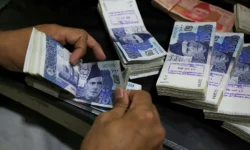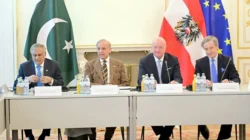Going cashless

08 December 2024
Published in: Business Recorder
Cash transactions continue to dominate Pakistan’s economy, with much of the activity occurring in the informal sector. This reliance on cash has stifled the growth of micro, small and medium-sized enterprises (SMEs) and limited their access to formal financial services such as loans, savings, and insurance.
RAAST, Pakistan’s real-time payment system, aims to address this challenge with its Person-to-Merchant (P2M) or Retailer Payment module. By enabling low-cost, instant payments, this module has the potential to integrate micro and small businesses into the financial mainstream, fostering growth, transparency, and financial inclusion.
The extensive use of cash is a major reason why 64 percent of Pakistan’s economy is in the informal sector? These undocumented transactions result in inconsistent financial reporting and prevent businesses from accessing essential services such as loans, savings accounts, or insurance.
This also leads to ineffective delivery of monetary policy. The central bank’s ability to control inflation or influence credit availability diminishes without formal financial channels. Currency in circulation (CIC) in Pakistan is significantly high compared to peers, limiting the economy’s responsiveness to monetary policy.
The retail and wholesale sector, contributing 18% to Pakistan’s GDP, heavily depends on cash – more than 80% of payments in this sector are cash-based. This dependency restricts businesses from accessing formal financial services, hindering their ability to grow sustainably.
Moreover, the widespread use of cash constrains the government’s ability to generate bank deposits, which could otherwise stimulate economic activity. As bank deposits rise, the bank multiplier effect comes into play, generating more credit for businesses and driving economic growth.
This, in turn, boosts tax collection and enhances the overall economy’s capacity to grow. Without a formal financial footprint, merchants depend primarily on personal savings, missing out on scalable financial tools and growth opportunities.
RAAST’s Retailer Payment module offers an effective solution by enabling seamless, real-time payments between individuals and merchants. Traditional payment methods, like card-based systems, charge transaction fees ranging from 1.5% to 2.5%, which discourages adoption by merchants with thin profit margins.
Unlike traditional card-based systems, RAAST promotes digital payments with minimal or zero fees. However, some digital payment providers continue to charge merchants a fee of around 1%, despite the State Bank of Pakistan’s recommendation to maintain zero transaction costs for seamless adoption of the RAAST Retailer Payments scheme. Additionally, RAAST ensures instant settlement, giving merchants immediate access to funds – critical for businesses that rely on steady cash flows for operations.
This module aligns with a growing global movement toward recognising payment systems as public goods. Payment platforms, such as RAAST, democratise financial systems by providing equitable access to digital payments for smaller merchants and underserved populations. With public infrastructure supporting transactions at little to no cost, all stakeholders – businesses, financial institutions, and regulators – must collaborate to ensure shared benefits for the economy.
The simplicity of RAAST’s payment model encourages adoption among small vendors, including street hawkers and grocery stores. With QR codes and mobile apps, even businesses with minimal infrastructure can transition to digital payments, eliminating the need for cash handling.
As businesses embrace digital payments, they open doors to formal financial services. A digital transaction history helps small merchants qualify for micro-loans, savings accounts, and insurance products, improving their financial resilience. Over time, the transition from informal operations to formal business models enables these enterprises to access scalable financial tools that drive growth and economic development.
Examples from other countries demonstrate how similar systems can reshape economies. India’s Unified Payments Interface (UPI), processing 12 billion transactions monthly, has transformed how individuals and businesses transact, with 57% of these transactions being P2M.
Similarly, Brazil’s PIX payment system has reduced ATM withdrawals and promoted digital payments across sectors. Both models highlight the role of national payment systems in improving financial inclusion, reducing cash dependency, and driving economic stability.
RAAST offers Pakistan the opportunity to replicate these successes and build a shared vision for the future payment landscape. Karandaaz Pakistan is currently developing a Digital Payments Index, which will benchmark key indicators such as demand-side behaviour, infrastructure availability, and ecosystem sophistication. This index will serve as a valuable tool, enabling stakeholders to track progress and align efforts toward a cohesive and inclusive payment landscape.
Despite its potential, RAAST’s Retailer Payment Module faces several challenges. Pakistan’s smartphone penetration rate is 63%, but poor broadband coverage and limited internet access in rural areas hinder adoption. For RAAST to succeed, investments in internet infrastructure and financial education are essential to ensure nationwide participation in the digital economy. Targeted campaigns to raise awareness among consumers and merchants will also play a key role in shifting behaviour toward digital payments.
Building trust in the system is crucial, especially for merchants accustomed to cash transactions. Economic incentives, such as discounts and rewards for digital transactions, can encourage both consumers and businesses to adopt RAAST’s Retailer Payment system. Over time, as habits develop, the convenience, speed, and financial benefits of RAAST will drive a natural shift toward digital payments.
RAAST’s Retailer Payment Module offers a transformative opportunity for Pakistan. As businesses shift from cash to digital payments, they integrate into the formal financial ecosystem, gaining access to tools that support long-term growth and sustainability.
By learning from global success stories like UPI in India and PIX in Brazil, Pakistan can foster an economy where digital payments become the norm. With the right infrastructure, awareness, and incentives, RAAST can accelerate financial inclusion, empower small merchants, and promote sustainable economic growth across the country.





